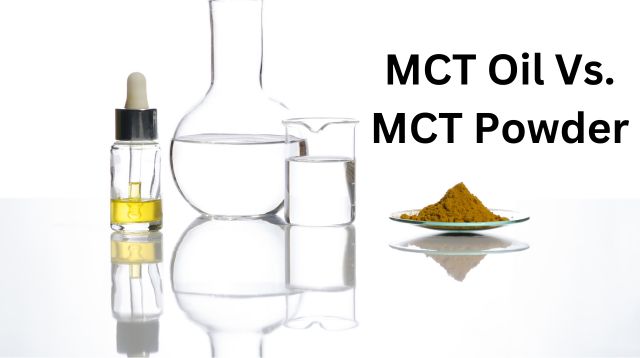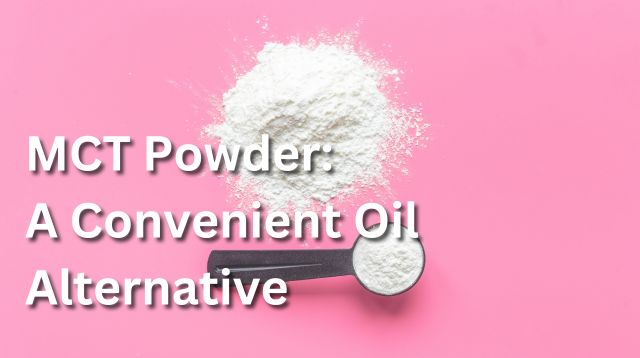MCT Powder And Athletes: A Comprehensive Guide for Fitness Enthusiasts

If you’re looking to take your athletic performance and recovery to the next level, MCT powder could be just what you need. This popular supplement is known for providing rapid energy boosts, enhancing endurance levels, and speeding up post-workout recovery, all of which are hugely beneficial when it comes to training hard. In this guide, we’ll examine in depth why athletes should consider making use of this powerful powder.
Key Takeaways
- MCT powder is a dietary supplement derived from medium-chain triglycerides. It may help enhance athletes’ immediate energy and stamina.
- Fitness enthusiasts have seen real results using MCT powder including a boost in physical performance, mental function, and recovery rates.
- MCT powder should be taken in appropriate doses for optimal potential performance benefits.
Understanding MCT Powder: The Basics
Medium-chain triglyceride (MCT) powder, derived from coconut oil, is a nutritional supplement gaining popularity for its unique physiological effects rooted in scientific principles. Composed of fatty acids, like caprylic acid (C8) and capric acid (C10), MCTs stand out due to their shorter carbon chain length, facilitating rapid digestion and absorption. Upon consumption, MCTs swiftly travel to the liver, where they are metabolized into ketones – small, energy-rich molecules. This metabolic pathway provides a rapid and sustained energy source, making MCT powder a valuable addition to various dietary approaches.
Medium-Chain Triglycerides
Medium chain triglycerides (MCTs), composed of fatty acid chains with a chain length from 8 to 10 carbons, have specific properties which differentiate them from other fats. They stay liquid at room temperature, are quickly broken down into energy that contributes towards fat burning, and don’t require long digestion before entering the bloodstream and going directly to the liver for processing. As such, MCTs offer an ideal source of energy in diets where carbohydrate intake is controlled. Athletes may take advantage of their rapid metabolism when it comes time for workouts or competitions.
MCT Powder Vs. MCT Oil
MCT powder and MCT oil both contain medium-chain triglycerides, which the body processes as a clean source of energy. MCT powder has an advantage, in that it is more user friendly. It allows people to mix it up in their drinks easily, without relying solely on liquid form MCT oils. Additionally, digestive issues may be less likely when using the powdered version.
MCT Powder And Mitochondrial Uncoupling
Unlike any other fat, MCT oil is absorbed directly through the wall of your gut into your bloodstream and goes directly into your liver. In the liver, MCT oil is converted into ketones, and ketones are what stimulate mitochondrial uncoupling. In a landmark 2008 study, researchers at Columbia University compared two groups of overweight people eating a diet with the same number of daily calories with one critical difference: one group ate olive oil, the other group consumed MCT oil. Fascinatingly, the individuals who ate MCT oil generated more heat, burned more oxygen, and lost more weight than those who consumed olive oil. If getting into ketosis and uncoupling your mitochondria is what you want, MCT oil is the way to go.
How MCT Powder Helps Potentially Benefit Athletes
MCT powder, when included in an athlete’s diet plan, provides multiple potential benefits, such as boosted energy and endurance. What’s more, this type of fat can be absorbed into the body quickly through digestion without being broken down and used for fuel instantly.
Rapid Energy Source
The body easily digests, absorbs and metabolizes MCTs into glycerol and medium-chain fatty acids (MCFAs), which are then taken directly into the bloodstream. The liver converts these MCFAs into ketones that can serve as a quick energy source for cells in the human body, making it an advantageous fuel choice for fitness enthusiasts during strenuous activities like training or competing.
Enhanced Endurance
Studies suggest that consuming a diet containing MCTs may help to enhance exercise performance. Research indicates that utilizing these fatty acids can increase athletic endurance by lowering levels of lactate. In doing so, it provides an energy source for prolonged physical activity while also preserving glycogen reserves -- which are essential to maintain excellent strength during workouts. As digestion rapidly metabolizes them, they provide fast energy.
Potentially Faster Recovery
High-intensity exercise can leave the body with an excess of lactic acid, leading to fatigue and a decrease in performance. MCTs have been found to aid quicker recovery by diminishing lactate build-up that occurs as a result of such exercises. It promotes metabolism, which boosts endurance capacity so muscles may mend more quickly following grueling workouts or sports activities.
Incorporating MCT Powder Into An Athletic Diet
For optimal athletic performance, fitness enthusiasts should always adhere to the recommended dosage of MCT powder. This may vary by supplement. It’s also important to combine your MCT powder intake with other nutrients in a healthy, balanced diet, in order to reap the best results. It’s always a good idea to consult with your healthcare provider for specific suggestions and recommendations.
In Summary: Getting An Edge
MCT powder can be a great tool for athletes, providing them with quick energy boosts and increased stamina as well as facilitating their recovery time. Thus, MCT powder serves to give competitive athletes and fitness enthusiasts that extra edge of strength and performance needed to help them succeed.
Frequently Asked Questions
Is MCT Powder Good For Athletes?
Athletes often take MCTs as an aid to potentially help increase their energy levels and boost athletic performance and endurance. How much MCT powder works for them may vary, as it does for anyone taking supplements.
Does MCT Powder Help Build Muscle?
MCT powder could be of use for those striving to build muscle mass, as it has the potential to boost energy and help with recovery. Despite this, studies have demonstrated that its impact on developing muscles or exercise performance is somewhat limited, and more research is needed.
Related posts


